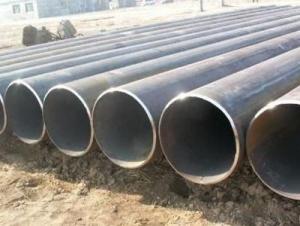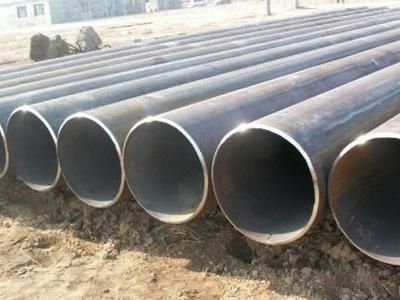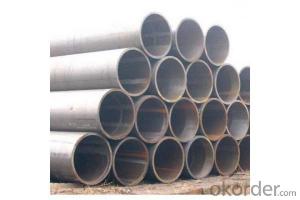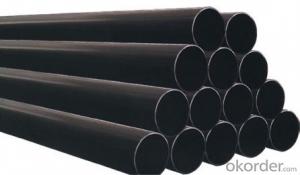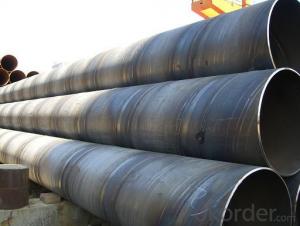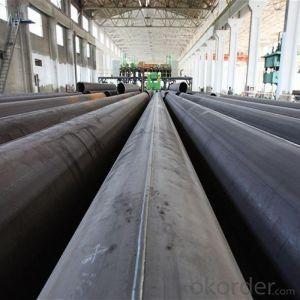API SSAW LSAW CARBON STEEL PIPE LINE OIL GAS PIPE 56‘’
- Loading Port:
- Tianjin
- Payment Terms:
- TT OR LC
- Min Order Qty:
- 1 m.t.
- Supply Capability:
- 3000 m.t./month
OKorder Service Pledge
OKorder Financial Service
You Might Also Like
Packaging & Delivery
Packaging Detail: | standard export packing or as customer's requirement |
Delivery Detail: | within 10 - 30 days |
Specifications
Spiral Welded Steel Pipes and Tubes
1.Material:Q195-Q235
2.Length:1-12m
3.WT:1.0-14mm
4.O.D.:20-273mm
Spiral Welded Steel Pipes and Tubes
Product Description:
1.Material : Q235,Q345,L245,L290,L360,L415,L450,L485,GrB,X42,46,X52,X56,X60,X65,X70,X80,X100
2,Standard: SY/T5037-2000,GB/T9711-2011,API Spec 5L PSL1/PSL2,ASTM A252\A53,ISO3183,DIN17172,EN10217,JIS G3457,AWWA C200,ASTM A139,ASTM A671,ASTM A672
3.Wall thickness: 3.0mm-30mm
4.Outer diameter: φ168mm-3020mm
5,Length: 5m-12m or as your requirement
6,Corrosion protection standard: DIN30670,DIN30671, AWWAC210, AWWA C203, SY/T0413-2002,SY/T0414-2002
7,Application: Oil, gas, natural gas, water pipe, thermal electricity pipe, steel structure engineering, etc
Q195-q345 Material Steel Pipe's Materials
Elements | Chemical Compsition% | Mechanical Property | ||||||
C% | Mn% | S% | P% | Si% | Yield Point (Mpa) | Tensile Strength(Mpa) | Elongation | |
Q195 | 0.06-0.12 | 0.25-0.50 | <0.050< span=""> | <0.045< span=""> | <0.030< span=""> | >195 | 315-430 | 32-33 |
Q215 | 0.09-0.15 | 0.25-0.55 | <0.05< span=""> | <0.045< span=""> | <0.030< span=""> | >215 | 335-450 | 26-31 |
Q235 | 0.12-0.20 | 0.30-0.70 | <0.045< span=""> | <0.045< span=""> | <0.030< span=""> | >235 | 375-500 | 24-26 |
Q345 | <0.20< span=""> | 1.0-1.6 | <0.040< span=""> | <0.040< span=""> | <0.55< span=""> | >345 | 470-630 | 21-22 |
Packaging & Delivery
Packaging Detail: | Normal exporting packing,in container or bulk vessel or as per clients' request |
Delivery Detail: | 2 months after confimed contract |
Specifications
Large Diameter API 5L X70 PSL2 LSAW Steel Pipe
Grade: X42, X46, X50, X52, X60, B, C
OD: 1.5"-28"
WT: SCH10-SCH160
Large Diameter API 5L X70 PSL2 LSAW Steel Pipe
Specifications:
u Standard: API 5L
u Grade: B, C, X42, X46, X50, X52, X56, X60, X65, X70, X80
u OD: 1.5"-28"
u WT: SCH10-SCH160
u Length: 5-12m
u Ends Finish: plain end, bevel end, grooved end
u Surface Treatment: bare, black varnished, oiled finish, red color, anti-corrosion, 3PE, FBE or epoxy coating
u Technique: hot rolled or cold drawn
u Application: api 5l steel pipe for conveying oil, water, gas
u Invoicing: based on theoretical weight or actual weight
u Payment Terms: L/C at sight, T/T or Western Union
u Trade Terms: FOB, CFR, CIF
u Certification: ABS manufacturing assessment, ABS design assessment, API 5CT, API 5L, DNV manufacturer certificate, ISO9001 quality management system certificate, ISO14001 environment management system certificate, GB/T28001 occupational health and safety management system certificate, A1 class manufacturing license of special equipment certificate, CCS, GL, LR, SGS, TüV, PDE
- Q: What is the outer diameter and wall thickness of the welded steel pipe of national standard DN250?
- DN250 is the nominal diameter, the outer diameter of the steel pipe is 273mm, the thickness is above 6.5mm.
- Q: How much is 4 inches steel tube MM?
- 1 inches =25.4 mm;4 inches =101.6 mm;The specification of steel pipe is usually nominal size;
- Q: How do you repair damaged steel pipes?
- To fix steel pipes that have been damaged, there are several steps you can take: First, you need to determine the extent of the damage. Assess how severe it is to decide if you can repair it or if you need to replace the entire pipe. Next, isolate and drain the section that is damaged. Shut off the water supply to that part of the pipe and drain any remaining water to prevent further leaks or damage. After that, clean the damaged area by removing any dirt, rust, or debris. You can use a wire brush or sandpaper for this job. Then, prepare the damaged area by roughening the surface with coarse sandpaper. This will help the repair material adhere better to the pipe. Next, choose a repair method based on the size and location of the damage. There are different options available such as using epoxy putty, pipe wraps, or clamps. Once you've chosen a repair method, follow the instructions provided to apply the repair material to the damaged area. Make sure it covers the entire damaged section and extends slightly beyond it for added protection. After applying the repair material, allow it to cure according to the manufacturer's instructions. This will ensure a strong bond and effective sealing of the damaged area. Once the repair has cured, turn the water supply back on and check for any leaks. If there are no signs of leakage, then the repair has been successful. If there are still leaks, you may need to reconsider the repair or seek professional help. Keep in mind that these steps are a general guideline for repairing damaged steel pipes. The specific repair method may vary depending on the size and severity of the damage. In more complex cases or if you're unsure, it's best to consult a professional plumber or pipe repair specialist.
- Q: What is the process of spiral steel tube production?
- Butt welding: the use of advanced double submerged arc welding technology for pre welding, internal welding, external welding. The welded steel tubes are cut into standard lengths using a plasma gage.
- Q: What is the difference between steel pipes and plastic pipes?
- The main difference between steel pipes and plastic pipes lies in their material composition. Steel pipes are made from a durable and strong metal alloy, while plastic pipes are composed of various types of plastic polymers. This difference in materials leads to variations in their properties and usage. Steel pipes are known for their high strength, resistance to extreme temperatures and pressures, and longevity, making them suitable for applications requiring robustness, such as in industrial settings or underground pipelines. On the other hand, plastic pipes are lightweight, flexible, and corrosion-resistant, making them ideal for plumbing, irrigation, and other non-industrial applications. Additionally, plastic pipes are easier to install and handle due to their lighter weight and flexibility compared to steel pipes.
- Q: How are steel pipes protected against seismic activities?
- Steel pipes are protected against seismic activities through various measures. One common method is the use of seismic restraint systems, which include bracing, clamps, and supports that are designed to withstand the forces generated during an earthquake. Additionally, pipes can be coated with corrosion-resistant materials to enhance their durability and resistance to seismic events. Regular inspection and maintenance of the pipes are also essential to ensure their continued protection against seismic activities.
- Q: What are steel pipes made of?
- Steel pipes are made of a strong and durable alloy known as steel, which is primarily composed of iron and carbon, along with small amounts of other elements such as manganese, silicon, and sulfur.
- Q: What are the different types of connections used with steel pipes?
- The different types of connections used with steel pipes include threaded connections, welded connections, and flanged connections.
- Q: Can steel pipes be used for conveying hydraulic fluids?
- Yes, steel pipes can be used for conveying hydraulic fluids. Steel pipes have high tensile strength and excellent resistance to high pressure, making them suitable for hydraulic applications. They can withstand the high operating pressures and temperature fluctuations that hydraulic systems often experience. Additionally, steel pipes are durable and have a long lifespan, ensuring reliable and efficient fluid transmission in hydraulic systems. However, it is important to ensure that the steel pipes used are compatible with the specific hydraulic fluid being conveyed to prevent corrosion or degradation of the pipe material.
- Q: What are the different pressure ratings for steel pipes?
- The different pressure ratings for steel pipes can vary depending on factors such as pipe size, wall thickness, and the type of steel used. Common pressure ratings for steel pipes range from 150 psi (pounds per square inch) to 2500 psi or higher.
Send your message to us
API SSAW LSAW CARBON STEEL PIPE LINE OIL GAS PIPE 56‘’
- Loading Port:
- Tianjin
- Payment Terms:
- TT OR LC
- Min Order Qty:
- 1 m.t.
- Supply Capability:
- 3000 m.t./month
OKorder Service Pledge
OKorder Financial Service
Similar products
Hot products
Hot Searches
Related keywords
